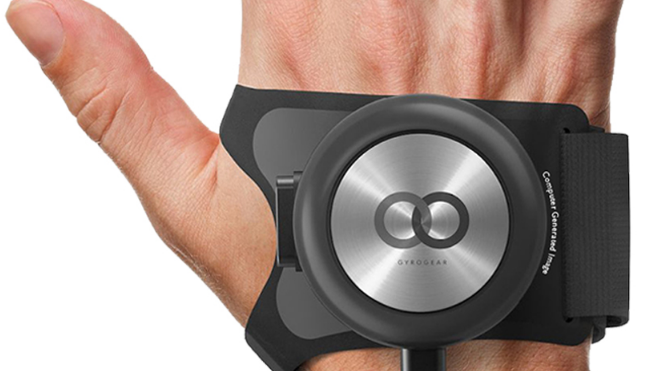
© GyroGear
Parkinson’s Disease affects ten million people globally. It is a progressive condition with difficult and distressing side-effects, such as causing hand tremors which impede or prevent the simple basics of drinking, eating and writing. Many more people suffer from Essential Tremor (ET).
One novel concept, which has the potential to offer significant improvements in their quality of life, uses gyroscopes.
These spinning discs may be widely used in aviation and electronics but operate on the same principles as children’s toy tops. But until now, such devices have not been applied to people. Invented while he was a medical student at Imperial College, Dr Faii Ong’s GyroGlove (to give its working name) is a wearable device, based on a miniature gyroscope to the back of the hand, that can help to stabilize these hand tremors. (Its potential is powerfully shown in this BBC film here.)
Over the past five years, the concept has attracted a great deal of attention from the medical world as well as from leading charities. Its development from the early lab simulators and prototypes has been funded with the support of Innovate UK via Innovation Vouchers and Smart Proof of Concept grants. But more intense work lies ahead - to conduct patient trials, finalise the design and manufacture of the product, secure regulatory approval and to release it into the market.
Winning a Horizon 2020 grant
Last year, with the support of EEN, the company secured a Horizon 2020 SME Instrument Phase 2 grant of €1.85m.
With a budget of around €1.6bn over the period 2018-2020, the SME Instrument is a European Commission programme to support groundbreaking innovative ideas being developed by companies such as GyroGear.
The programme provides phased and progressive support through a mix of grant funding and tailored business support. There are no predefined topics - but only the best and most impactful ideas will receive support.
Horizon 2020 and other EU programmes still represent a great opportunity. UK organisations that secure funding until the end of 2020 will be guaranteed by the UK government. (Those holding grants from Horizon 2020 need to submit information about them into a UKRI portal designed to capture basic details about the grants.)
Getting the pitch right
To help GyroGear secure its Phase 2 award - it was just one of six UK SMEs selected for interview in its particular round - the EEN team provided advice on the pitch presentation, helping to prepare and address the key points that the award evaluators would be looking for in the interview. This is a highly competitive process and getting the pitch right is crucial to winning the grant.
All SME Instrument winners are entitled to free business development coaching and business acceleration support. Following the Phase 2 award announcement, the EEN team in Cambridge worked with GyroGear’s management team to carry out a detailed needs analysis and helped to identify a suitable coach from the European Commission’s database of approved coaches.
Given the rigour of the H2020 programme, this represents a strong vote of confidence in GyroGear's progress to date and market potential.
“EEN provided quality, timely support,” says Dr Ong. “As one of only two successful British companies for this application, we were acutely aware of the odds.
"We were immensely grateful to EEN for reaching out to us immediately after release of the results for the first round, and spending over an hour to detail the interview and pitching process.
"Given the three business days between candidate selection and submission of pitch deck, the EEN’s rapid support was absolutely vital to our focus and success. We are and will continue working closely with the EEN to ensure GyroGear’s success within the EU.”
Heading to market
The project looks set to achieve its objectives of finalising its engineering and design specifications, through to regulatory approval and multiple-market entry in early 2021.
“A device like the Gyro Glove could offer greater independence for those living with the condition, and let people get back to doing both the things they love and everyday tasks like cooking and writing,” says Julie Dodd of the national charity Parkinson’s UK.” When the device is ready for public launch, we hope to assess and include it in our 'Tried and Tested' list of apps and devices for Parkinson’s, as we know the community will be really interested.”
Given the three business days between candidate selection and submission of pitch deck, the EEN’s rapid support was absolutely vital to our focus and success.
Dr Faii Ong, GyroGear






